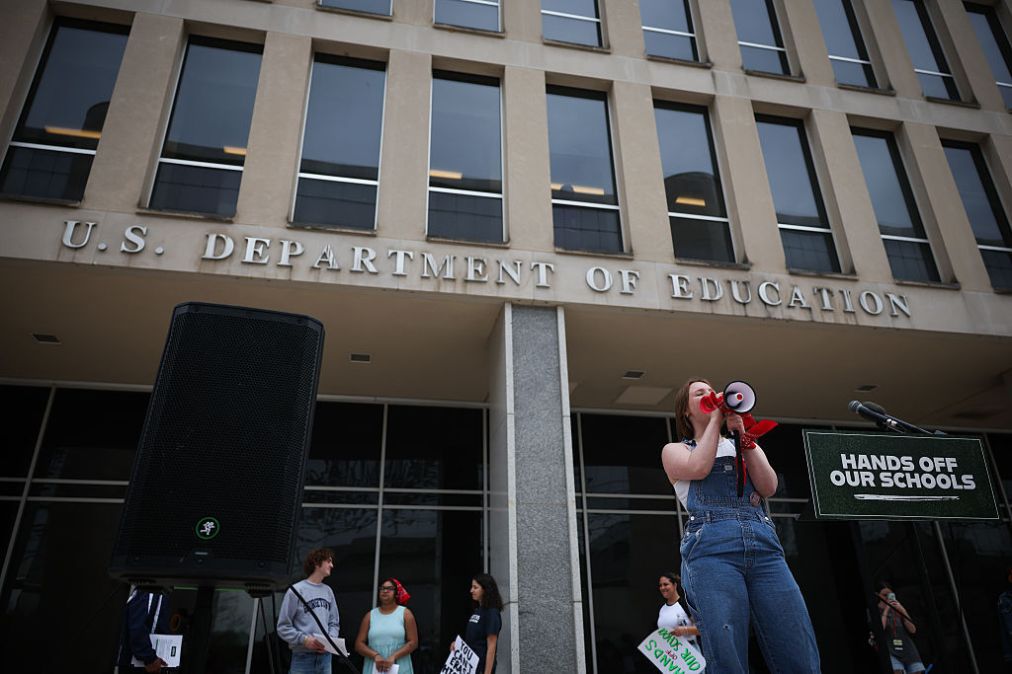Trump’s push for more admissions data collides with a hollowed-out Education Department

The Trump administration wants the Education Department to collect more college admissions data, even as it slashes the very staff that ensures the statistics are credible and accurate.
From early childhood to K-12 and higher education, schools across the country have relied for decades on the Education Department’s data collections to inform policy. President Donald Trump now wants to leverage it to investigate whether race-based preferences are used in college admissions.
But with the agency’s research offices gutted, various data collection contracts in limbo and the National Center for Education Statistics (NCES) — the agency’s statistical branch — left with just three employees, questions swirl over whether the task is feasible.
While the agency appears to be reinstating some contracts with private research firms, former staff and data experts fear the administration’s recent moves against data leaders and offices risk undermining public trust in federal statistics.
“What’s going to slow way down is how quickly we get the data and how much we trust it,” said Eric Mason, one of the dozens laid off from the Institute for Educational Sciences (IES), the Education Department’s research arm.
“Trust is probably even more important than the data itself,” Mason told FedScoop. “If you don’t trust that the numbers are correct and you don’t believe them, it gets … thrown in with everything else on the internet.”
As the dust settles on the sweeping layoffs throughout the agency, terminated staff and outside observers warn the long-term impacts are just beginning, especially for one of its core missions: collecting, analyzing and reporting data to the public.
Agency research teams “effectively dismantled”
The Education Department faced some of the steepest workforce cuts earlier this year as Trump pushed for the ultimate dismantling of the agency. The move, which the president said would give states more authority, requires congressional approval.
The agency, which is already the smallest Cabinet-level department, initiated a reduction in force in early March and cut nearly half of its employees. About 1,400 agency employees were placed on administrative leave in March, but the layoffs were on hold until July, when the Supreme Court ruled the administration could proceed with the reduction.
Aug. 1 marked the final day for most laid-off workers at the department, while some senior leaders officially departed later in the month.
In doing so, the NCES was “effectively dismantled,” according to Peggy Carr, who served as the commissioner of the research center from 2021 until she was abruptly placed on administrative leave in February. Carr was NCES’s associate commissioner for nearly 20 years.
“It is impossible for three, five, or even a dozen people to fulfill the statutory responsibilities of NCES or to fully inform policymakers, educators, and the American public of the condition of education,” Carr wrote in a lengthy statement in July. “What has occurred is a quiet, devastating shutdown and decimation of a critical national institution.”
Shelley Burns, who worked as a mathematical statistician at the NCES for more than three decades, told FedScoop that the cuts go beyond just a loss of staff — “it’s the loss of expertise” and “decades of expertise” in the niche field of education data. Burns is a member of AFGE Local 252, the union representing some terminated agency employees.
“They can say, ‘Oh, we really don’t need experts anymore. … We can just get anybody and they can just run the contract.’ But you lose a lot when you don’t have people that really understand the data,” Burns said.
For more than 150 years, NCES has overseen the collection of federal education data, employing a specialized group of data analysts and statisticians tasked with reviewing and vetting research. The center, housed under IES, employed fewer than 100 people before the cuts, relying primarily on third-party contractors to collect data nationwide.
NCES is responsible for major studies like the National Assessment of Educational Progress, also known as the “nation’s report card,” along with the Integrated Postsecondary Education Data System (IPEDS), which surveys U.S. colleges and universities.
More data, fewer workers
IPEDS was thrown into the spotlight last month when Trump issued a memo calling for the expansion of data collection to determine whether schools are using race-based preferences in the college admissions process. Education Secretary Linda McMahon directed the NCES last month to make the changes within the 120-day timeline outlined in Trump’s memo.
Under the proposal, colleges with a selective admissions process would be required to submit disaggregated data by race and sex and cross-reference it with GPA, admissions test scores, family income, Pell Grant eligibility, and parents’ educational level.
A notice filed by the Education Department in the Federal Register estimates the proposed expansion could add more than 740,500 hours to the agency’s workload. Research staff at NCES are typically responsible for developing these estimates.
“If they want to introduce a new collection, it’s puzzling how they’ll do that when most of us, most of the people who are working in data, aren’t even there to do the work that’s still required by Congress,” said Keith McNamara, who worked at the Education Department as a data governance specialist before he was laid off in March.
This is not the first time that race-related data changes have been proposed for IPEDS reporting, but as many experts told FedScoop, the complications outweighed the potential benefits in the past.
Bryan Cook, director of higher education policy at the Urban Institute, noted Trump’s proposal is broader than just race, adding a new level of challenges with minimal staff to handle it.
“The level of complexity around this request is extremely significant,” Cook said. “The irony is that a lot of these things people have been asking [for], like policy researchers, people who were advocates of equity and admissions … the reason it hasn’t ever been added is because it’s extremely difficult to add.”
Sean Simone, the former associate commissioner of the Administrative Data Division at NCES, told FedScoop the scope of the request is “much higher” than anything he worked on at the agency.
“The number of hours it takes to respond to these surveys is going to be off the scales, and there was no thought on if institutions have the data or if they can even collect this data given these timelines,” Simone said.
Concerns grow over collection feasibility, accuracy
Collecting the data is just half the process, especially when it comes to the complexities of IPEDS, multiple terminated workers said. While former workers contended that the research arm relied on third-party contractors for much of the actual data collection, agency staff and technical review panels played a central role in the process before and after numbers were received.
When additions to IPEDS were proposed in the past, technical review panels were convened, giving researchers from higher education institutions and advocacy groups the opportunity to examine how and whether an institution could meet new reporting requirements.
This process included discussing the complications and variability of answers, such as the distinction between weighted and unweighted GPAs, according to Cook, who served on these technical review panels.
These variables, Cook said, “on their face would seem pretty straightforward,” but, “in fact, they’re not. These are all things that have to be resolved when you’re trying to collect standardized data that allows you to compare one college and university’s admissions data to another.”
When Trump’s Department of Government Efficiency members eliminated dozens of the agency’s contracts earlier this year, those for technical review panels were included in the cuts.
“There used to be content expertise at NCES that’s not there right now,” Simone told FedScoop, adding the Federal Register notice made clear “there was either no one in the department that could tell if the requests for the data were feasible, if this was doable, [or] if you’re going to get good quality data out of it or they just didn’t care.”
“It doesn’t sound like they thought through the process,” he later added.
Once the data was received, the IPEDS vetting process was time-consuming due to the numerous checks of datasets from across the country, according to Jason Cottrell, former data coordinator for the agency’s Office of Postsecondary Education.
“There’s some guardrails, because you don’t want to mess with the data that an institution is reporting if it could affect some of their standings,” Cottrell said. “If an institution put a comma where a period is supposed to be, that could really make a difference in some of the calculations that are there.”
“It’s about the full picture and making sure that the governance of the data exists,” added Cottrell, a member of AFGE Local 252. “Now they have gotten rid of all the data coordinators who are supposed to be doing that, making sure that the data was high quality, that it was uniform, that it was secure, that it was identifiable.”
A source familiar with the Education Department’s operations told FedScoop that those remaining at the agency are working to maintain the same data quality routines. The source, who was granted anonymity to speak candidly without fear of retaliation, noted staff are working to ensure the data is released with the “full faith and confidence of the federal government.”
When data converges with politics
Concerns about the future of the Education Department’s data efforts come amid the Trump administration’s broader battle over the role of traditionally nonpartisan federal statistics.
Tensions hit an inflection point last month when the president ordered the firing of the head of the Bureau of Labor Statistics, prompting condemnation from statistical and public data leaders.
Like the BLS and numerous federal agencies, the data released by the Education Department is expected to be free from political influence. According to the 2002 law establishing the IES at the Education Department, the research body is expected to be “objective, secular, neutral and nonideological.”
“When the second Trump administration came on, the political appointees didn’t talk to the career [senior executive staff] when making major decisions like contract cancellations [or] even the NCES SES staff, which are supposed to interact,” Simone said. “It was just like a firewall.”
Trump’s August memo suggested colleges could be circumventing the Supreme Court’s 2023 ruling against the use of affirmative action in admissions, writing that the “persistent lack of available data — paired with the rampant use of ‘diversity statements’ and other overt and hidden racial proxies — continues to raise concerns about whether race is actually used in practice.”
“With this new collection that’s come out with IPEDS, I think they’re just trying to get data in there for internal analysis, enforcement of the [administration’s] perspective on civil rights,” Simone added. “I wouldn’t be surprised that it would never be released until another administration comes.”
In the absence of quality data, former NCES staff fear education policy will be in jeopardy.
“There’s no way you can make education more effective without data. If you stop collecting data, if you stop providing the data that allows others to use it in ways that they need to use in order to improve education, we’re basically flying blind,” McNamara said.
Added Cottrell: “They’re not trying to make decisions for the good of the student. They’re trying to make the decision before they collect the data.”
What this means for third-party contractors
The Education Department pushed back on the idea that agency cuts will have an effect on areas of data collection. Madi Biedermann, deputy assistant secretary for communications, told FedScoop that IES’s dismissed employees “conducted none of the research related to NAEP, the College Scorecard, and IPEDS.”
“That work is all done through contracts that are still maintained by the department,” Biedermann wrote in a statement.
Several of these contracts, however, were cancelled in the DOGE cuts. Simone told FedScoop that “there was this disconnect between the cutting of the money and what the results of that are.”
“They were looking on the money side of the ledger,” he said, “But they did not understand that less funds would impact quality, timeliness, or reduce the usability of the data.”
Many of the eliminated research contracts are being reinstated, while others are being modified to accommodate the proposed data example, the source familiar with the agency said. Following Trump’s August memo, the agency’s Office of the Chief Data Officer and the undersecretary’s office began engaging in a more active partnership with those left in NCES to assist in managing the IPEDS contract operations.
However, another source familiar with the eliminated research contracts told FedScoop some of the reinstated contracts have “decreased significantly in value.”
“The challenge here is that there was no plan for anyone to do this work,” the source said. “They were canceled in the absence of a plan to continue to collect data. It was done in the absence of a really thoughtful discussion around which surveys are most critical.”
Notably, action in the courts could also revive some contracts. A federal judge in Maryland ruled last month that the administration illegally closed the agency’s Comprehensive Centers (CC) and Regional Educational Laboratories (REL) programs.
The REL centers partner with schools and education stakeholders nationwide. Some of these centers have gone on to become major nonprofit research outfits.
The research community celebrated the judge’s decision.
Knowledge Alliance, a trade association representing many of the organizations with the eliminated contracts, called it a “victory for the millions of students, educators, families and policymakers who rely on the vital insights and tools provided by RELs and CCs.”
Mason, who oversaw REL contracts at the agency, said the work has “sat there for nine months doing nothing.”
“It’s been a huge, devastating loss and it’s a lot of people, a lot of relationships with teachers and superintendents and state leaders that have been damaged. It’s going to be hard to recoup that,” he said.
Others, including Knowledge Alliance President Rachel Dinkes, believe it is not too late for these contracts.
“I think the programs can and should be restarted — and while the RELs may need to look somewhat different, their work can provide critical support to state and districts,” Dinkes told FedScoop. “This is not an ideal situation, but given what’s happened, it’s important to make the most of available resources and keep the work moving forward.”






